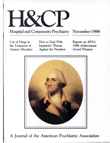Institutional Response to Inpatients' Threats Against the President
Abstract
Federal law makes it a crime to threaten the life of the President of the United States. However, psychiatric clinicians have no legal obligation to report all such threats encountered in their practice. In deciding whether to report a threat, they must balance their obligation to protect the President with their duty to up-hold a patient's rights to confidentiality and to freedom from self-incrimination. The authors present a case highlighting the issues faced by clinicians in deciding whether to report threats made by psychiatric inpatients and offer guidelines for dealing with such situations. In general, responses to patients' threats against the President should follow the Tarasoff principle, which asserts that clinicians who conclude that a patient presents a danger to another person should take steps to protect that person.
Access content
To read the fulltext, please use one of the options below to sign in or purchase access.- Personal login
- Institutional Login
- Sign in via OpenAthens
- Register for access
-
Please login/register if you wish to pair your device and check access availability.
Not a subscriber?
PsychiatryOnline subscription options offer access to the DSM-5 library, books, journals, CME, and patient resources. This all-in-one virtual library provides psychiatrists and mental health professionals with key resources for diagnosis, treatment, research, and professional development.
Need more help? PsychiatryOnline Customer Service may be reached by emailing [email protected] or by calling 800-368-5777 (in the U.S.) or 703-907-7322 (outside the U.S.).



